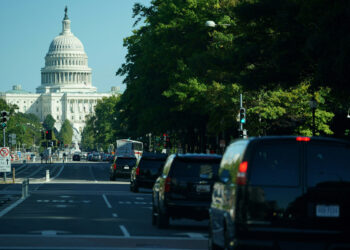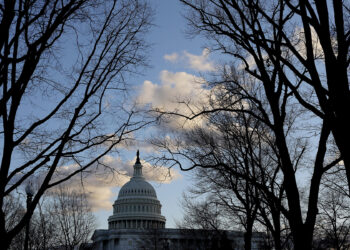International Coalition of 72 Organizations Urges Support for Proposed NDAA Amendment
(Washington D.C., November 15, 2021): The U.S. Senate should approve an amendment to the 2022 National Defense Authorization Act (NDAA) that would require a report on the humanitarian impact of Israeli restrictions on movement, access, and goods in and out of Gaza and potential solutions to the crisis there, including international monitoring of the border crossings, said Democracy for the Arab World Now (DAWN) and the Friends Committee on National Legislation (FCNL) in a letter to the Senate today.
Seventy two national and international organizations, including MoveOn, J Street, Churches for Middle East Peace, Arab American Institute, American Muslims for Palestine, Oxfam America, Norwegian Refugee Council, Human Rights Watch, Amnesty International USA, Win Without War, National Council of Churches, Demand Progress, Quincy Institute for Responsible Statecraft, IfNotNow, Al Haq, and Eyewitness Palestine, jointly signed the letter, reflecting a groundswell of support for closer scrutiny of the role of U.S. military support in contributing to the crisis in Gaza.
"The proposed Gaza amendment is a milestone in overdue recognition that America's unconditional military and political support for Israel has helped enable the imprisonment and suffering of millions of Palestinians in Gaza during a 14-year Israeli blockade that stands as one of the longest-lasting acts of collective punishment in recent history," said Raed Jarrar, Advocacy Director for DAWN. "The Sanders amendment is an important step forward to taking responsibility and seeking solutions for this man-made crisis, including a long-overdue U.N. monitored border control mechanism."
Since 2006, Israel has imposed a near total blockade on Gaza and has waged four wars killing 5,948 Palestinian and 60 Israelis according to B'Tselem. At the 48th session of the UN Human Rights Council last Monday, the Global Institute for Water, Environment and Health and the Euro-Mediterranean Human Rights Monitor highlighted one aspect of the humanitarian disaster: water in Gaza is "undrinkable" and "slowly poisoning" people. "The long-term Israeli blockade has caused a serious deterioration of water security in Gaza, making 97% of the water contaminated," a joint statement said. "The residents of the besieged enclave are forced to witness the slow poisoning of their children and loved ones."
Basic reconstruction efforts after the May 2021 Israeli bombardment of Gaza have barely started due to the failures of the so-called Gaza Reconstruction Mechanism (GRM) and the ongoing siege of the Gaza Strip. The GRM is a temporary agreement created by the United Nations and agreed to by the Palestinian Authority and Israel in September 2014. The mechanism is designed to address Israel's security concerns while allowing the entry of construction materials into the occupied Gaza Strip.
The NDAA Gaza amendment, proposed by Senator Bernie Sanders, would require the U.S. Comptroller General to submit a report to Congress assessing the economic, humanitarian, political, and psychological impact that Israel's severe restrictions on movement and access are having on Palestinians in Gaza, as well as on recovery and reconstruction in Gaza following Israel's May 2021 airstrikes.
It also requires the Comptroller to determine whether lifting Israel's blockade, or other solutions, would help to address the humanitarian and political crisis in Gaza, and to assess replacing the current inspection mechanism at Israel's Gaza crossings with an international inspection mechanism supervised by the United Nations and modeled after the United Nations Verification and Inspection Mechanism for Yemen. The amendment also proposes for the first time reviewing implementation of a new U.N. backed agreement to secure freedom of movement for the Palestinian people in Gaza.
According to UN agencies and humanitarian aid groups that deliver aid in Gaza, the Gaza Reconstruction Mechanism has failed to ameliorate the impact of Israel's closure or ensure even a minimal baseline of civilian wellbeing and humanitarian access.
"The 14-year Israeli siege of Gaza has created immense suffering for millions of Palestinians and fueled endless cycles of violence," said Hassan El-Tayyab, legislative director for Middle East policy at Friends Committee on National Legislation. "We urge the Senate to adopt this important amendment and support a new international agreement on movement and access for Gaza that lifts the siege, ends the humanitarian crisis, sustains a durable ceasefire, and helps bring about long-term peace between Israelis and Palestinians."
Under international law, the Gaza Strip remains occupied territory, and is an undivided part of the Occupied Palestinian Territories. Notwithstanding its withdrawal of its unlawful Israeli settlements in Gaza, Israel remains the occupying power Under the Fourth Geneva Convention and is still responsible for the health and welfare of the Palestinian civilian population in Gaza. According to Human Rights Watch, Israel's economic blockade of Gaza amounts to collective punishment against civilians.
The full letter and list of signatories can be read below.
November 15, 2021
Dear Senators,
We, the undersigned organizations, urge that you support Sen. Sanders' amendment to the FY2022 National Defense Authorization Act (NDAA) to require a report on the humanitarian impact of severe restrictions on movement, access, and goods in and out of Gaza. Should it be adopted, we hope you will work to preserve it through conference negotiations.
This important provision would require the Comptroller General of the United States, in consultation with the President, the Secretary of State, the United Nations, and other key stakeholders, to submit a report to Congress assessing the restrictions on Gaza, including:
- The economic, humanitarian, political, and psychological impact that severe restrictions on movement and access has on Palestinians in Gaza;
- The economic and material impact of restrictions on movement and access on recovery and reconstruction efforts following the Israeli airstrikes in May 2021;
- Whether the implementation of the Gaza Reconstruction Mechanism is adhering to international dual-use standards;
- Possible solutions to address the humanitarian and political crisis in Gaza, including the lifting of Israel's sweeping restrictions on the movement of people and goods;
- The feasibility of replacing the current inspection mechanism at Israel's crossings into Gaza with an international inspection mechanism for commercial and humanitarian goods entering and exiting Gaza, to be supervised by the United Nations and modeled after the United Nations Verification and Inspection Mechanism for Yemen;
- The feasibility of implementing a new international agreement, facilitated by the United Nations in consultation with all key stakeholders, on movement and access for Gaza, in a transparent and accountable way that addresses humanitarian, economic, and legitimate security concerns.
After roughly 14 years, the severe restrictions on Gaza have left nearly 2 million people with severely limited access to clean water, electricity, and food. These restrictions prevent critical supplies from reaching Gaza which are necessary for maintaining and rebuilding water treatment and sanitation infrastructure.Roughly 97 percent of Gaza's tap water is contaminated, depriving civilians of regular access to drinkable water. The restrictions have also left Gaza's electrical grid in ruins, forcing many Palestinians to live without electricity for nearly half the day. More than 80 percent of Gaza's population relies on humanitarian aid for subsistence
New solutions are needed to end Gaza's humanitarian crisis, decrease tensions and help end the endless cycles of violence that have endangered the lives of Israeli and Palestinian civilians caught in the crossfire. The Gaza Reconstruction Mechanism, according to the UN and humanitarian aid groups working to deliver aid in Gaza, has not been able to overcome the restrictions and ensure civilian wellbeing and humanitarian access. This report is a critical step for Congress and the American people to understand the full impact that current restrictions on movement and access have on Palestinians in Gaza and will facilitate the identification of structural reforms to address the crisis. This reporting requirement includes feasibility studies on new internationally-supervised inspection measures, assesses if the current Gaza Reconstruction Mechanism adheres to internationally-recognized standards for dealing with the issue of "dual-use" goods, and studies the efficacy of establishing specific benchmarks for the volume and timeframe of imports.
We, the undersigned organizations, urge you to support Senator Sanders' amendment to the FY2022 NDAA, to create more transparency and accountability regarding the humanitarian impact of the restrictions on Gaza and to advance solutions to address the crisis, which will advance human security and safety for Israelis and Palestinians alike. Thank you for your consideration of this important matter.
Sincerely,
- About Face Veterans Against War
- Action Corps
- Al-Haq
- American Baptist Churches (USA)
- American Muslims for Palestine
- Americans for Justice in Palestine Action
- Amnesty International USA
- Arab American Institute
- Campaign Against Arms Trade
- Christian Peacemaker Teams
- Church of the Brethren, Office of Peacebuilding and Policy
- Churches for Middle East Peace
- CODEPINK
- Demand Progress
- Democracy for the Arab World Now (DAWN)
- Disciples Palestine Israel Network
- Empowering Pacific Islander Communities (EPIC)
- Episcopal Peace Fellowship
- Evangelical Lutheran Church in America
- Eyewitness Palestine
- For All
- Freedom Forward
- Friends Committee on National Legislation (FCNL)
- Global Ministries of the Christian Church (Disciples of Christ) and United Church of Christ
- Historians for Peace and Democracy
- Human Rights Watch
- ICNA Council for Social Justice
- IfNotNow
- J Street
- Just Foreign Policy
- MADRE
- Maryknoll Office for Global Concerns
- Mennonite Central Committee U.S.
- Methodist Federation for Social Action
- Middle East Children's Alliance
- MoveOn
- National Council of Churches USA
- National Network for Immigrant and Refugee Rights
- National Writers Union
- Neighbors for Peace
- Nonviolent Peaceforce
- Norwegian Refugee Council
- On Earth Peace
- Our Revolution
- Oxfam America
- Peace Action
- Presbyterian Church (USA)
- Progressive Democrats of America
- Quincy Institute for Responsible Statecraft
- Reformed Church in America
- ReThinking Foreign Policy
- RootsAction.org
- Showing Up for Racial Justice
- South Asian Americans Leading Together (SAALT)
- Sunrise Movement
- The Episcopal Church
- The United Methodist Church – General Board of Church and Society
- Tree of Life Educational Fund
- Tunisian United Network
- Unitarian Universalist Association
- United for Peace and Justice
- United Methodists for Kairos Response (UMKR)
- US Boats to Gaza
- US Council of Muslim Organizations
- US Palestinian Council
- Win Without War
- Women for Weapons Trade Transparency
- Women's Action for New Directions (WAND)
- World BEYOND War
- Yemen Freedom Council
- Yemen Relief and Reconstruction Foundation
- Yemeni Liberation Movement







